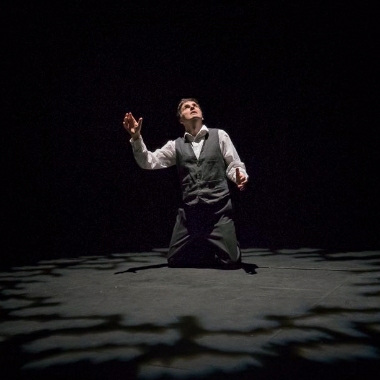Titanic: The Comedy?
Even 101 years after the sinking of the unsinkable ocean liner—1498 souls lost in the icy sea—no one is going to turn the story of tragedy and hubris into an SNL skit. But Belfast playwright Bernard McMullan, like all good Irish writers, was able to find the humor at the bottom of the pit of sadness—and craft a story that, despite the books, plays, movies, and Discovery Channel specials, you likely haven’t heard.
He’s bringing his play, “Jimmy Titanic,” to the Adrienne Theater on Sansom Street in Philadelphia, for two weeks starting Wednesday, February 27.
“This was a bit of a challenge of a play,” said McMullan in a phone interview two weeks ago. “It’s been done before, so it had to be innovative. I’m not sure people want a new serious story of the Titanic, so it was up to us to bring it to another level, to instill some comedy into it.”
The eponymous Jimmy—played, along with 20 other characters in this one-man play, by Colin Hamell—is actually Jimmy Boylan, a former shipyard worker who knew every rivet on the ship where he was also a sailor on its first—and last—voyage. But the play opens in Heaven, where Jimmy is “good friends with the Angel Gabriel and God” and a figure of some prestige, so closely associated is he with the “Titanic brand,” says McMullan.
“It’s a little bit of a play on all of us slaves to marketing and branding. The Titanic brand lives on and Jimmy used the brand to give him status in heaven.”
McMullan uses the comedy as comedy is often used in Irish plays—as juxtaposition with the horror, as relief from the “dark passages,” including how people met their death.
“It’s ultimately the story of dreams shattered,” he says.
“Jimmy Titanic,” which was critically acclaimed in its New York run, explores many ruined dreams, from the immigrants looking for a new life to the officials and people of Belfast who were so proud of “their ship” and fearful of what the sinking will do to the future of shipbuilding in Belfast.
“I’ve really concentrated on the Irish side of things, including ship building in Belfast,” said McMullan. “Being from Belfast, it’s really part of the culture there and I grew up hearing stories from people who worked on the shop. In Belfast, people will ask, ‘Why do you celebrate this ship that sank?’ and the people of Belfast will tell you, ‘It was allright when it left here.’ That’s their way of shifting the blame elsewhere.”
Though the Titanic was a luxury liner, its sole purpose was not to carry wealthy people from Europe to America and back again. “It was built as an emigrant ship,” said McMullan, a former TV news reporter who read and studied Titanic’s history, even attending lectures by its discoverer, Robert Ballard of Woods Hole Oceanagraphic Institute in Massachusetts and visiting Titanic exhibits all over the world, including one in Pigeon Forge, TN (yes, the home of Dollywood).
In fact, according to the Titanic exhibit now on display at the Franklin Institute, the White Star Lines raised the bar on comfort even in steerage because it was counting on European immigration to boost its profits. “But the stories of the immigrants on the Titanic are forgotten amid the stories of the Astors, the Rockefellers, and other millionaires on the ship,” said McMullan.
Colin Hamell, who starred in the play in New York, plays many of those immigrants from all over Europe who were fleeing oppression, poverty, or the law—or just looking for a fresh start. “He wouldn’t tell you this himself, but he does a great job,” said McMullan. “He’s wonderful with accents and changes of character.”
Hamell has some high praise for McMullan too. “Talking to people after the play was interesting. They found the historical parts as compelling as the humorous parts. Bernard really got the balance right,” he said.
You can see “Jimmy Titanic” at the Second Stage at the Adrienne, 2030 Sansom Street, in Philadelphia, Wednesday through Sunday, from Feb. 27 to March 10. Tickets are $25 for adults, $18 for students. Call 215-567-2848, or go to http://www.brownpapertickets.com/event/316089
See more photos from the play.



